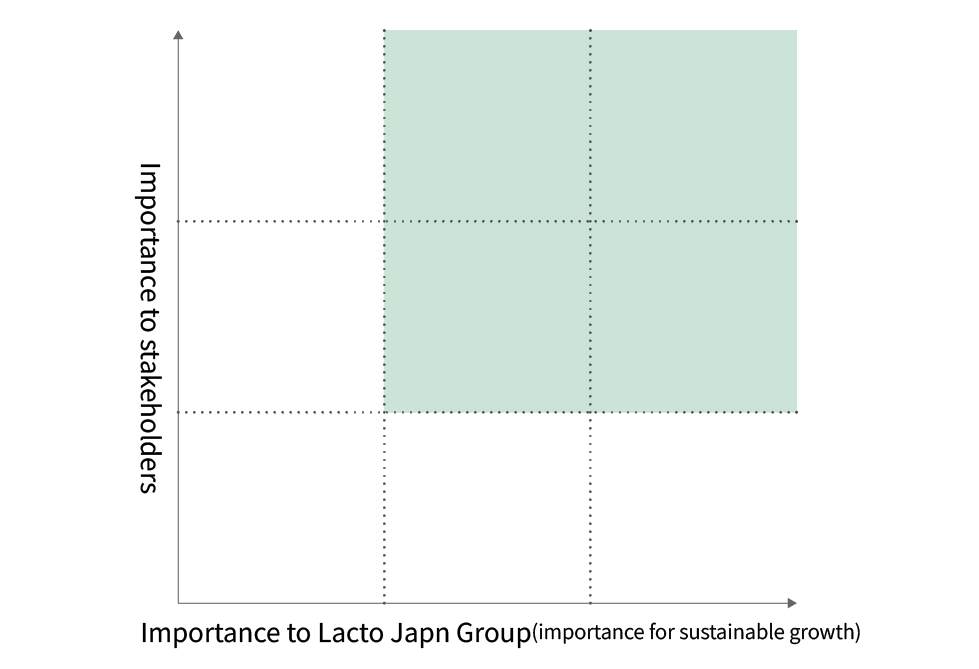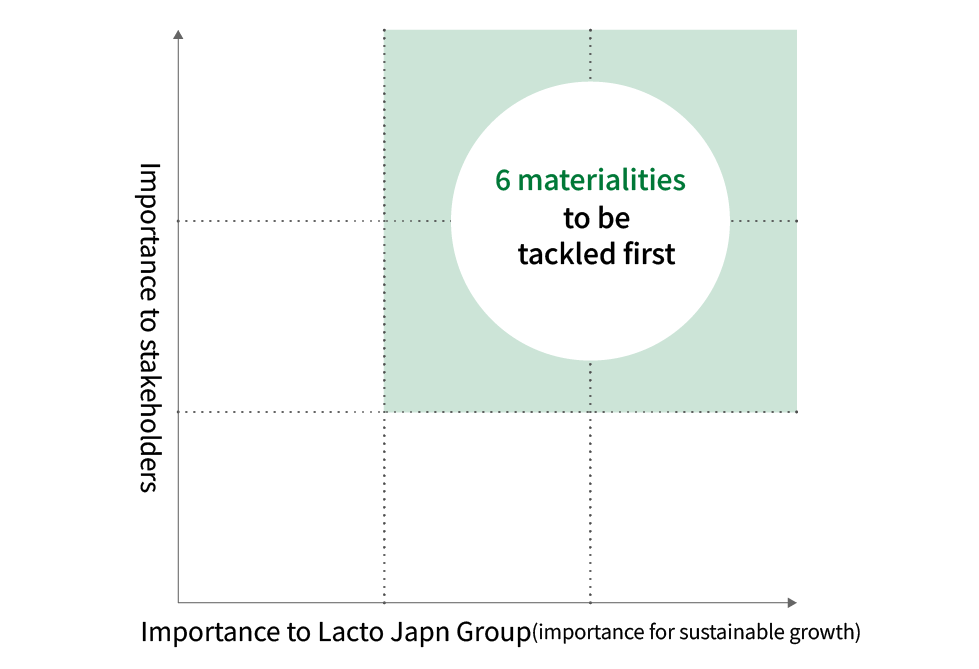Lacto Japan Group aims to grow sustainably with society through its business activities. In this context, we examined management issues that should be prioritized by taking advantage of the Group's strengths and characteristics, and established six materialities as issues of particular importance based on our management philosophy.
In order to realize our management philosophy (Purpose) of "Bringing health and happiness to people by connecting the world through food," it is important to continue to provide a stable supply of food ingredients that contribute to nourishment and health. Therefore, we clarified issues from three perspectives: "supply chain," which connects our global suppliers to customers in Japan and Asia; "global environment and community," which also includes the dairy and livestock farming industries, the starting point for procurement of ingredients; and "management foundation.”
We will use these materialities as a guideline to promote initiatives that link our growth strategy with individual measures, aiming to improve the sustainability of both our company and society.
In identifying materiality, Lacto Japan Group have organized risks and opportunities based on international trends, initiatives, and other societal demands, as well as the business environment in which we operate, and evaluated and examined them from both our stakeholders' and our own perspectives.
-
STEP 1
Consideration of materiality candidates
- Based on international frameworks and guidelines such as the GRI Standards and ISO 26000, the ESG index disclosure requirements survey, benchmark surveys, interviews and questionnaires with internal departments, and the knowledge of experts, we identified 10 social issues (megatrends) that are relevant to Lacto Japan Group and examined their impact on Lacto Japan Group's sustainable growth in terms of both "risks" and "opportunities".
-
STEP 2
Narrowing down materiality candidates
- We evaluated the importance of social issues that are highly relevant to Lacto Japan Group from the two perspectives of "importance to Lacto Japan Group" and "importance to stakeholders" and created a materiality map.

-
STEP 3
Identification of materiality and related SDGs priorities
- Regarding the materiality matrix reflecting the scoring results of STEP 2, we held an internal workshop to discuss its relevance and importance to the business again.
- We organized issues based on the opinions raised at the workshop, identified tentative materialities, and clarified the individual measures corresponding to each and the related SDGs priority issues.

|
●Supplying safe and reliable food |
-
STEP 4
Confirmation of validity
- After briefing the external experts, we received their opinions on the identified tentative materialities and related SDGs and exchanged views with the Board of Directors.
-
STEP 5
Management approval
- The contents compiled by the CSR/ESG Promotion Project Team were discussed by "the Executive Committee" and approved by "the Board of Director consisting" of all directors, including outside directors, to determine Lacto Japan Group's six materialities, individual measures, and corresponding SDGs.
We reviewed and updated our materiality in response to changes in the external environment, the growing importance of natural capital, and heightened awareness of human rights.
|
Materiality |
Overview |
KPI |
Related SDGs |
|
・Obtain and maintain GFSI-recognized certification FSSC 22000 at all overseas production sites |
sdgs03e sdgs12e |
|
|
・Handling volume of dairy-derived proteins (such as WPC): ・Handling volume of plant-derived raw materials: 2025: 530 tons → 2028: 700 tons |
sdgs02e sdgs03e sdgs09e |
|
|
・Conduct regular strategic discussions with existing suppliers and develop new suppliers ・Propose applications to suppliers and customers, and pursue joint development |
sdgs02e sdgs08e sdgs09e sdgs17e |
|
|
・Aim to achieve carbon neutrality by 2050 |
sdgs07e sdgs12e sdgs13e sdgs17e |
|
|
・Establish and disclose a human rights policy, and conduct human rights due diligence and human rights training ・The ratio of female director , The ratio of female manager : 30% or more by 2030 ・Conduct diversity & inclusion training annually with a 100% completion rate ・Achieve a short working-hour utilization rate of 80% or more among employees returning from childcare leave ・Onduct engagement surveys ・Provide ¥200,000 per employee in education expenses by 2028 |
sdgs03e sdgs05e sdgs08e sdgs10e |
|
|
・Update the business continuity plan (BCP) regularly and conduct training once a year ・Conduct information security training once a year and targeted email attack drills twice a year ・Conduct evaluations of the effectiveness of the Board of Directors and address key issues ・ Achieve zero cases of serious compliance violations*2 |
sdgs08e sdgs10e sdgs16e |
*1 Functional ingredients: Ingredients used in products other than general foods, expected to provide health benefits or functional effects.
*2 Serious compliance violations: Violations of laws, treaties, or regulations that impact social credibility, business performance, and other areas